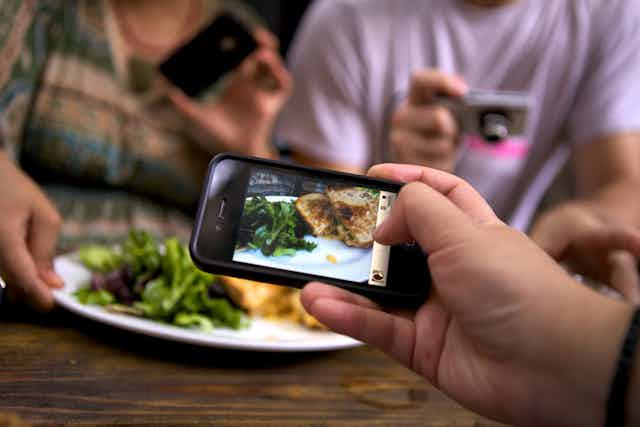Smartphones at the table. Food blogs. Photographs of perfect meals posted online before anyone has taken a bite. Amateur restaurant reviews.
Many people don’t just want to cook good food and eat it. They want to review it, blog about it, and take photos of it. This is the age of the “foodie”.
I’ve spent a number of years researching 50 foodies in Melbourne and I’ve discovered that these new food enthusiasts are best understood not as hobbyists who just like to cook and eat, but as amateurs.

As amateurs, foodies are defined by the professional-style approach they take to shopping, cooking, restaurant dining and, for an increasing number, food blogging. It’s through the latter endeavour that foodies are making perhaps the most visible impact on our public dining scene.
As foodies take their pursuit ever more seriously a new power struggle is emerging: in one corner, professional food critics, brandishing their experience, legitimising authority and traditional media credibility; in the other corner, amateur foodie bloggers, armed with their smartphones, digital SLRs and free blogging software.
Food blogging has become increasingly popular in recent years, so much so that the international blogging awards, the Bloggies, have a separate category for the Best Food Blog. The blog indexer Technorati lists more than 20,000 food blogs in its directory.
There are more food blogs than blogs devoted to sport, science, fashion, celebrity, travel, TV, music or film.

Entries on amateur food blogs fall into two main categories: recipes and restaurant reviews. Interestingly, it is only restaurant reviews that have attracted significant concern and criticism, particularly from traditional media and professional critics.
One key criticism directed at restaurant bloggers and amateur reviewers is that they lack the credentials and expertise to judge restaurant cuisine. What such arguments fail to acknowledge is that there aren’t any established qualifications in food criticism to begin with.
The only qualifications most professional food critics hold are in journalism – and some can’t even claim those.
So expertise in judging food – for professionals and amateurs alike – is based on experience, rather than formal training and qualifications. That’s why restaurant blogging has become the site of such contention in contemporary food cultures.

By contrast, recipe blogging has not been seen as posing a threat to its professional counterparts because there are qualifications in cooking; most culinary experts are credentialed chefs, which distinguishes their expertise from amateur bloggers.
But the worry about amateur bloggers and restaurant reviewers from within traditional media doesn’t just turn on whether amateurs deserve the power to make or break restaurants and influence consumer tastes.

There are also concerns about how they use this power. Amateur bloggers have been criticised for a perceived lack of ethics. Their mode of reviewing gets compared unfavourably to the way professionals go about it. The pros often wait for new restaurants to get established, visit on more than one occasion, spend their employers’ money, and account to an editor.
The thing is, the amateur blogger’s experience is far more representative of that of the average diner. They visit the restaurant once – for new restaurants, often as soon as they open, pipping professional reviewers at the post - and spend their own money.
Despite insinuations that amateurs can easily be “bought off”, not one of the foodie bloggers in my research accepted free food in return for reviews. They were also anonymous to restaurateurs – unlike well-known professional critics.

Moreover, while they were not accountable to an editor, those bloggers did believe the ethical responsibility of restaurant reviewing to be very important. Indeed, the ethical burden of publishing a negative review weighed heavily on them. I encountered a general awareness of the potential impact a bad review could have on a restaurant’s reputation, and an avoidance of making such an impact.
Another common perception is that all amateur food bloggers aspire to become professionals. The bloggers who do make this transition attract most of the attention in traditional media – most famously America’s Julie Powell whose blog The Julie/Julia Project led not only to a book deal but also a Hollywood film.
Most of the food bloggers I spoke to respected professional critics but none were seriously pursuing a career in food journalism. They may have had occasional daydreams of being a professional critic, yet most were happy to keep their reviewing as a leisure pursuit.

So if not to launch a professional journalism career, why do foodies blog?
On one level, it’s because they enjoy sharing knowledge and advice about food with others (and having people follow it is even better).
On a more personal level, it’s about creating gastronomic memoirs for themselves, documenting their relationship with food, which is fundamental to their foodie identity. This is particularly important given the ephemeral nature of food: photographing or writing about a gastronomic experience fixes it in time, and gives the foodie something enduring to which they can return.
Overall, I found the main attraction of blogging for foodies is that it functions as a form of what I call “creative production” – that is, it’s about finding everyday ways to express a sense of creativity and to have the feeling of making something in this postindustrial world where most of us no longer have an opportunity to make things or be creative in our paid work.
Restaurant blogging, then, is not simply an exercise in consumerism gone wild. It’s more a way of taking a consumer activity and making it productive and creative, turning it into a craft activity.
That’s something worth considering the next time you’re forced to wait patiently as your friends snap and post their meals.
Isabelle de Solier’s new book on foodies, Food and the Self: Consumption, Production and Material Culture, is published by Bloomsbury.

